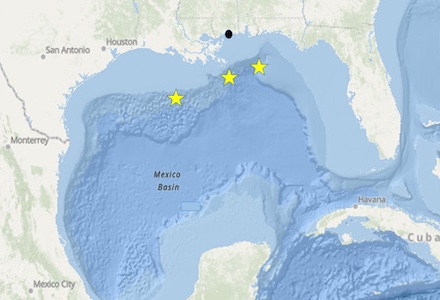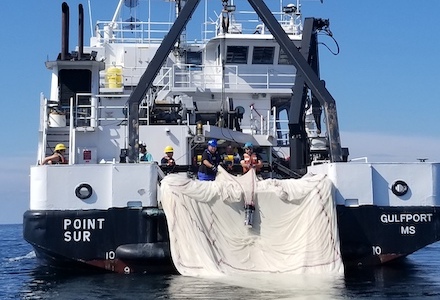By Matthew Cimitile, University Communications and Marketing
Using tools and technology that comb the ocean depths for new discoveries, USF Biology Professor Heather Judkins will explore the Gulf of Mexico as part of a research consortium that recently received more than $7.5 million in grant funding.
The funding is going towards DEEPEND, which stands for Deep-Pelagic Nekton Dynamics of the Gulf of Mexico, and consists of marine scientists from multiple universities and research organizations across the country. A renowned cephalopod expert, Judkins will oversee the collection and analysis of species such as octopods, squids and pelagic snails during various DEEPEND research cruises across the Gulf of Mexico over the next five years.
She will depart on the first cruise for one of the projects, called “Deep Sea Benefits,” on September 5 and spend two weeks exploring the transition zone between the continental shelf and continental slope of the Gulf of Mexico.

Upcoming DEEPEND research cruise destinations in the Gulf of Mexico.
This transition zone begins a sharp drop from the shallower continental shelf down the slope to the depths of the ocean floor.
“We want to explore this slope region and drastic transition zone to the deep ocean to know what is down there, who is eating who, how does energy and nutrients move to get a better picture of this deep underwater environment,” Judkins said.
The “Deep Sea Benefits” project received a $3.2 million grant from the National Oceanic and Atmospheric Administration (NOAA) to collect and analyze species and food web dynamics associated with this region of the Gulf of Mexico. In conjunction with other groups, the project will examine the abundance, behavior and interactions of marine mammals, fish, turtles, crustaceans and cephalopods to understand biological communities at these depths, both during the day and at night.
Midwater organisms are collected using a Multiple Opening Closing Net and Environmental Sensing System (MOCNESS). The system is a series of nets towed behind a research ship that can be opened and shut independently, so that each net samples a specific patch of water. When each net is brought on board the research vessel, scientists gather the organisms and collect relevant data, such as environmental DNA and animal tissue samples.
Judkins is also piloting a squid jigging project to catch larger squid that evade the nets.
“Think of a really big fishing rod, but with an electric reel that goes to 600-700 meters in the water. We could potentially pull up squids from the deep that range in size from two to three feet or more if we are lucky,” she said.

Retrieval of the MOCNESS during a deployment.
A second grant totaling $3.7 million from the NOAA RESTORE program will go towards an ongoing research project Judkins has been working on since 2010. DEEPEND/RESTORE II is a continuation of the RESTORE I project, which studies the short- and long-term impacts of the 2010 Deepwater Horizon Oil Spill on marine life and ecosystems below 200 meters. The project collects data on contaminants and impacts on food webs to determine changes in the ecosystem and to marine life to inform management.
While collecting an abundance of data, the DEEPEND cruises have also resulted in the discovery of new marine life, including three new species of Bathyteuthids, a type of squid that lives in depths between 700 and 2,000 meters. The first RESTORE II cruise is set to take place in May 2025 to examine waters 150-200 miles from shore.
“It is encouraging that NOAA supports such long-term research. By the time we are done, we will have the largest dataset in the world for the midwater region,” Judkins said. “And for me personally, going out to sea on these research cruises is still fun and exciting.”
You can follow along on the expedition’s blog here.